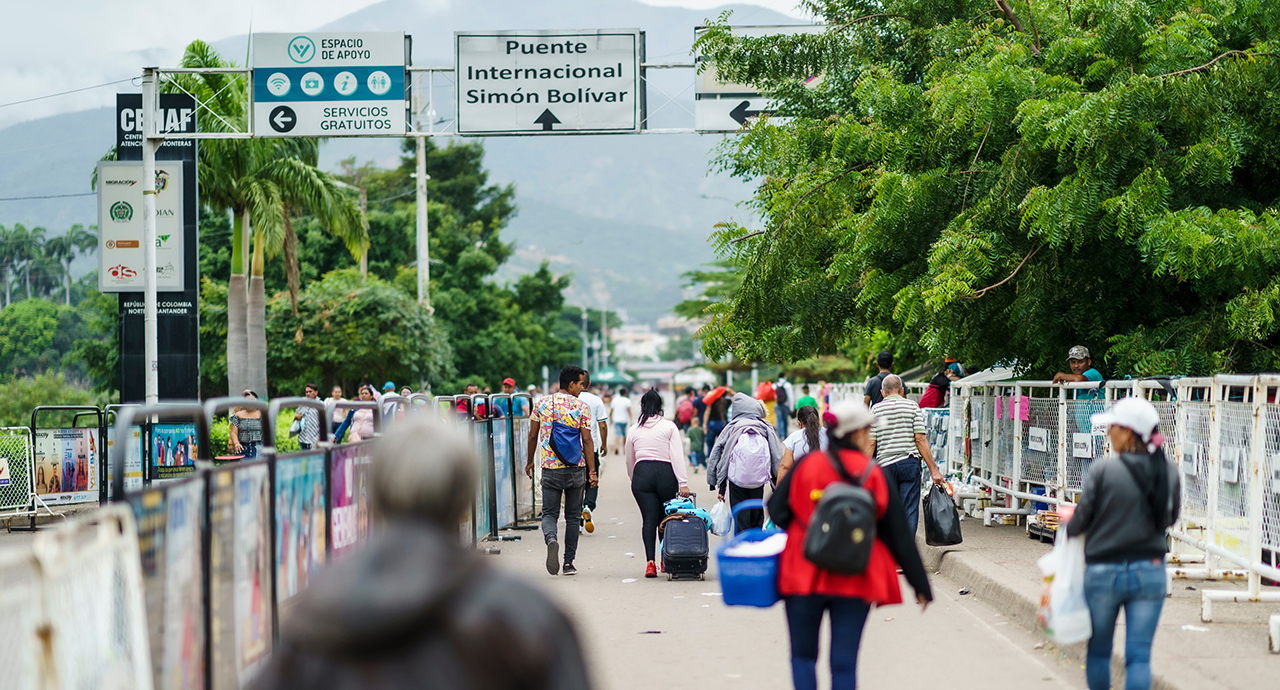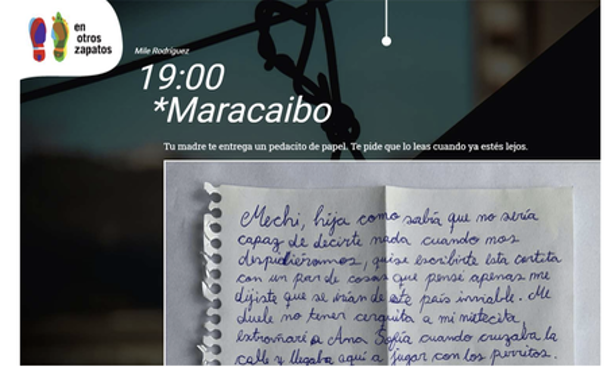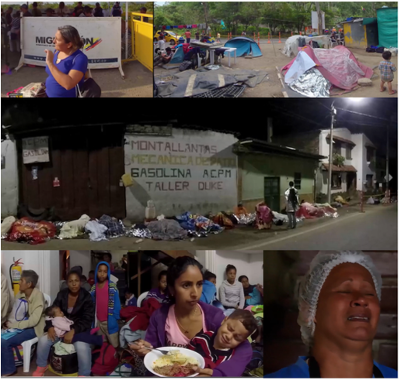How Does it Feel to Be Part of the Minority? Impacts of Perspective Taking on Prosocial Behavior

Context
Integrating refugees into host countries poses a significant challenge, particularly in developing countries, where 86% of displaced populations reside. One major obstacle is the negative attitudes some locals hold towards migrants and their perceived impact on local communities. The lack of integration denies refugees access to crucial opportunities, such as jobs and quality public services, which is essential for improving their welfare. Moreover, prejudice against migrants has documented negative impacts on both migrants and society as a whole.
In the Latin American context, over the past six years, more than five million Venezuelans have fled the ongoing humanitarian crisis, relocating to other countries. Neighboring Colombia has been the primary destination for Venezuelan refugees, with approximately 1.7 million residing in major cities such as Bogota. This drastic demographic shift has led to deteriorating attitudes towards Venezuelans, with Colombia experiencing the third-largest decline globally in the Gallup Migrant Acceptance Index between 2016 and 2019.
The study explores the impact of a low-cost intervention that promotes pro-social behavior among Colombians towards Venezuelan refugees in order to help them better integrate into the Colombian society.
Project
In a collaborative project with researchers from various institutions, we conducted an online behavioral experiment involving 897 participants in Bogota, Colombia. The study aimed to assess the impact of perspective-taking interventions on prosocial behavior and attitudes towards Venezuelan migrants. Participants were randomly assigned to either play an online game that immersed them in the life of a Venezuelan migrant or to watch a documentary about Venezuelans crossing the border on foot. The interventions aimed to increase altruism, trust, and empathy towards migrants. This experiment provides insights into how perspective-taking can improve social attitudes and behaviors towards migrants in host communities.
Behavioral Barriers:
Stereotypes
Describe an over-generalized belief or cognition about a group of people that is used to make inferences regarding a single member of the group. Stereotypes are often resistant to revision. In this context, locals may hold certain negative views about Venezuelan refugees and use these beliefs to inform their decision-making.
Out-group Bias
Outgroup bias is the tendency to harbor negative feelings towards individuals who are not part of our own group. This bias not only involves unfavorable thoughts and perceptions about these outsiders but also often manifests as hostility towards them.
Behavioral Tools:
Perspective-taking
Perspective-taking is the ability to look beyond one’s own point of view and consider someone else’s feelings and overall circumstances. A social-psychology based intervention that provides local Colombians with direct information on the journey of a Venezuelan refugee and their struggles in emigrating is anticipated to improve local residents’ attitudes and prosocial behavior towards refugees.
Design and Challenges
The experiment was conducted from October to November 2020 in partnership with the Rosario Experimental and Behavioral Lab (REBEL) at the Universidad del Rosario in Bogota, Columbia. The study was structured as a between-subjects online experiment with 897 individuals participating. Participants were randomly assigned to either one of the two treatment groups, the game (316 subjects) or the video (243 subjects), or the control group (272 subjects). After the experiment, prosocial behaviors and attitudes were elicited using a dictator game and survey.
The treatments were as follows:
1. Game Treatment
Subjects engaged in an activity called En Otros Zapatos (EOZ), meaning "In Someone Else’s Shoes." Developed by the Inter-American Development Bank, the EOZ platform aims to foster empathy towards vulnerable and underrepresented groups by immersing users in interactive stories that allow them to experience life from the perspective of an outgroup member. The experiment centers on the fictional story of a Venezuelan migrant to Colombia, "Mile Rodriguez," depicting the hardships she and her family endured in Venezuela, which compelled their emigration to Colombia. Throughout the game, users are prompted to make decisions on behalf of Mile and her family, each choice leading to a different life path. Participants also receive letters and voice messages from Mile's relatives and friends, listen to songs significant to her, and view photographs of her family. On average, participants take 29 minutes to complete the game.

Figure 1. Game Intervention
2. The Video Game
Subjects watched the documentary “Walking for Freedom,” which depicts the struggles of Venezuelans as they cross the border on foot to Columbia. Throughout the 6-minute video, subjects are shown images of the dangerous conditions endured during the attempt to cross the border, including the mountains in El Paramo de Berlin, the common route for migrants. The video also includes several emotional testimonials about family separation as a result of the journey and includes a final call to action, urging viewers that “More help is needed.”

Figure 2. Video Intervention (images from the documentary Walking for Freedom)
After the treatment, subjects completed a survey to assess its impact on (1) prosocial behavior, particularly altruism and trust; (2) attitudes towards migrants; and (3) perspective-taking and empathy. Altruism was measured using an incentivized dictator game, where participants had the option to donate a portion of their payment to a Venezuelan charity. Trust was gauged by asking participants to indicate their agreement with the phrase “One can trust Venezuelan migrants” on a four-point scale. Empathy and perspective-taking were evaluated using subscales from the Interpersonal Reactivity Index.
Challenges
The experiment faced two threats to validity, namely social desirability bias and experimenter demand effects. Social desirability bias is the tendency of individuals to alter their innate responses due to being observed by others, while experimenter demand effects refer to the tendency for subjects to act according to the perceived hypothesis of the study. The study, however, rules out these possible threats as driving factors.
Results
1) Both treatments increase altruism towards Venezuelan migrants. The game and video treatments result in a significant increase in the probability that a local Colombian will donate to a Venezuelan charity by 10.6 and 11.1 percentage points, respectively. The authors did not reject the null hypothesis that the treatment effects are equal.
2) The game and video treatments positively affect trust towards Venezuelan migrants; however, only the impact of the game treatment is statistically significant. The game increases trust towards Venezuelans by 0.29 standard deviations relative to the control group. Additionally, the null hypothesis that the game and video have the same impact is rejected.
3) Using a combined index of prosociality, both treatments have a positive and significant effect. The game increases prosociality by 0.27 standard deviations, while the video increases the index by 0.20 standard deviations.
4) Both treatments result in a positive and significant improvement in the attitudes index by 0.33 standard deviations. The game and video treatments positively impact the assessment that circumstances beyond a migrant's control are most related to a Venezuelan immigrant's poverty (versus lack of self-effort) by 8.9 and 10.5 percentage points, respectively. Conversely, the treatments do not significantly impact attitudes about job opportunities between migrants and natives or attitudes about the right to segregate migrants from neighborhoods.
5) The game intervention increases the perspective-taking scale by 0.18 standard deviations, whereas the video treatment does not have a statistically significant impact on any scales. These results align with the objectives of the game activity, which aimed to increase perspective-taking by making participants step into the shoes of a migrant.
6) The interventions have no statistically significant impact on commonly held beliefs such as migrants competing with locals for jobs or increasing crime. Notably, the game has a positive and significant impact on the belief that “immigrants contribute to a country more than they take from it.”
Policy Implications
- Low-cost interventions promoting perspective-taking and empathy can enhance prosociality, improve attitudes towards migrants, and reduce prejudice against vulnerable groups in society.
- Given their affordability, these interventions can be deployed widely, ensuring broader impact without substantial financial burdens. Policymakers should consider incorporating such interventions into broader social integration programs to address the exclusion of marginalized groups.
- Immersive experiences can effectively build trust. Governments can develop and promote similar interactive platforms to bridge the trust gap between locals and migrants, thereby enhancing social cohesion.
